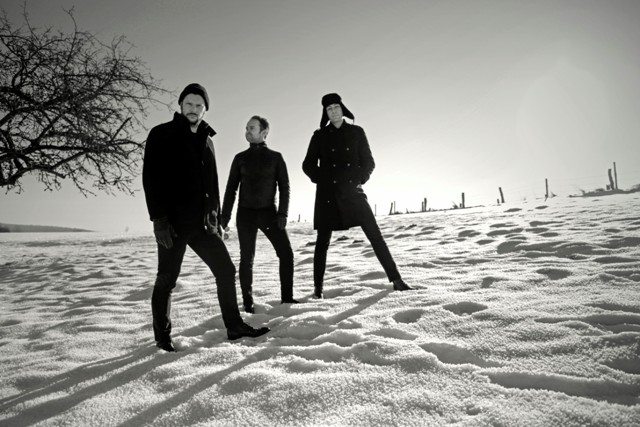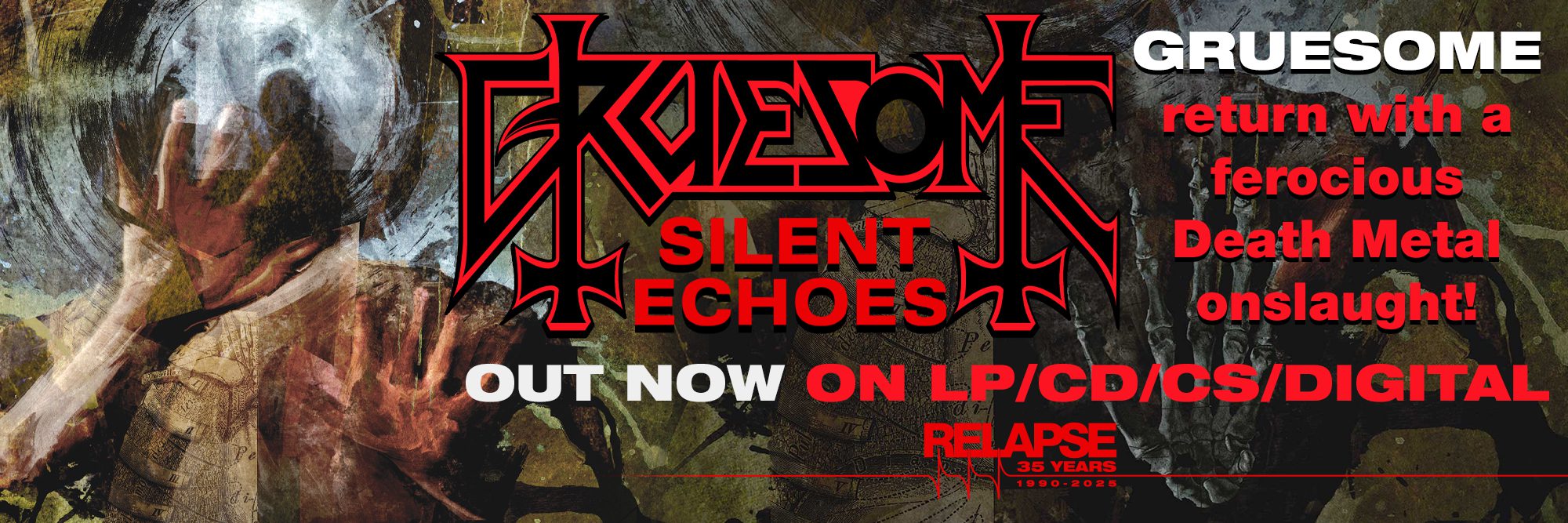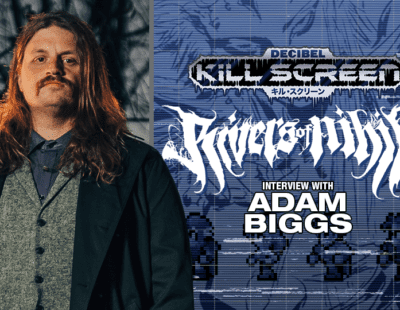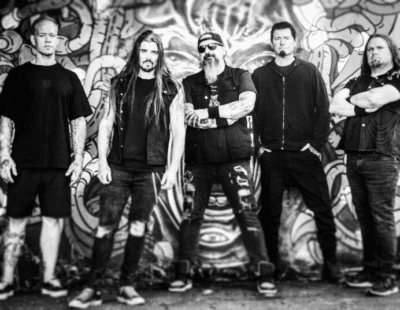
There are musical surprises. And then there are musical surprises. Valborg aren’t an easy band to peg. The band from Bonn, Germany have tried the patience of categorization from their inception in 2002. Valborg’s debut album, Glorification of Pain, continues to stupefy, confound, and amaze. That was eight years ago. Since Glorification of Pain, the Germans have made five more stunning, left-of-center albums, the latest of which is the brutal brain scratcher, Endstrand.
Unlike its predecessor, the keyboard-centric doom epic Romantik, Endstrand is all attitude, a bullhorn of thick, beefy riffs, pounding unalloyed percussion, and ear-splitting vocals (in German). On the surface, it’s not too different from an unlikely fusion of Prong, Godflesh, and Entombed, all in their ’90s heyday. But dig into Valborg’s beasty brawn and it’s an album that calculates and confronts. Musically, it’s smart yet savage. From the 2-minute ironfist to the face, “Jagen”, to Endstrand’s brilliant mid-album introspection (“Bunkerluft” and “Geisterwürde”) to the soul-crushing closer “Exodus”, Valborg have made an album that nobody expected.
Like vocalist/guitarist Christian Kolf describes below, Endstrand polarizes. It’s a love or hate thing with Valborg in 2017. Recognizing Endstrand‘s forthright intensity, the craftsmanship behind it, the lyrical tone, and the excellent production, I had to talk to Kolf to see if he and his comrades had lost their minds or stumbled onto something altogether absurdly first-rate. Turns out it’s the latter.
I understand you had most of Endstrand written right after Romantik. The albums are very different sonically. What pushed you in the direction of Endstrand? More abrasive, aggressive, and darker. It’s uglier too.
Christian Kolf: It just happened over some time. After Romantik, we started to experiment with some synths again but with a more straightforward approach. We had this post-nuclear Eastern Bloc sci-fi vibe going on. After some time we decided that we didn’t want to work with synthesizers for this album that much. So the music automatically became heavier and we were more focused on a energetic live performance of the songs. When Markus Siegenhort (Lantlôs) came into the picture he helped us to shape the sound of Endstrand, to make it this brutal boulder.
Romantik was very keyboard based. Endstrand brings back the guitars with a vengeance. Was that the idea? To have more riff-based songs?
Christian Kolf: Yeah, as I said. It was a a process and the fact that we wanted to create some some easy and brutal songs that we like to play live.
There’s almost a militaristic side to Valborg on Endstrand. “Jagen”, “Blut Am Eisen”, “Stossfront”. Can you talk about the approach you took to these songs?
Christian Kolf: It is not as conscious as you think. We easily write songs, that has never be a problem for us. Some parts in “Stossfront” were written out of jam we had; I took those ideas home and arranged the song there, brought it back to rehearsal and that’s it. “Blut am Eisen” was written in one hour, we just wanted to create a Ministry-song. And with “Jagen”, I guess Cannibal Corpse inspired us. I remember when we wrote that song and made the first demo, I had this feeling again, that I would have when I was young and played in my first band. This feeling when you are aware that you have created something super-heavy and you go home and feel proud of it. You think about it when you go to bed. I like “Jagen” very much, because it’s super brutal and cosmic at once. We were all in one room when Jan [Buckard] recorded the vocals for this track and it was so extreme, loud and intense. Everyone got totally triggered by his performance.
I also think the harshness of the vocals in addition to the German phonology also provide that drill sergeant vibe.
Christian Kolf: It’s the first full-album performance of Jan. We encouraged him to do that after we heard the first vocal demos. We all knew he had to sing on the whole album, because it just fitted so perfectly to whole vibe.
Then, the album gets into more atmospheric songs. “Bunkerluft” and “Geisterwürde”. Was the idea to have a couple of heavy hitters then some quieter, darker songs to even out the intensity?
Christian Kolf: Yes, that was the idea. Beside that, we just liked those songs and enjoyed playing them, so there was never a doubt to put them on the album.
The album picks up again after “Geisterwürde”. More riff-based songs like “Alter” and “Plasmabrand” and “Ave Maria”. Do these songs relate, musically or conceptually, to the first three songs?
Christian Kolf: Not with intention. Florian did the order of the songs. He just wanted to create a good flow.
How did “Plasmabrand” end up as the video song? The video’s got a disquieting vibe to it. Was the intent to make viewers uncomfortable?
Christian Kolf: “Plasmabrand” is one of our most favorite songs. We like this track so much, so it was a simple decision. The team who filmed this song was very professional. We developed some rough ideas before, then we just performed and they filmed. It was a very ‘flowy’ process.
I get a lot of ‘90s sounds or styles coming into Endstrand. Maybe bits of Prong, Corrosion of Conformity, The Obsessed, Godflesh, Entombed, etc. Am I close or are Valborg’s riffs merely the product of an imaginative musical mind?
Christian Kolf: Again, not with intention. But you mention great names and feels great to hear that you get these vibes. As I said before, sometimes songs just happen like that: Let’s write a song like this and that band. But we are totally aware, that it will always become a Valborg-style song in the end. We sound like who we are, because we are unable and to uninterested to sound like another band. It never worked out. It’s more of a circumstance and not a decision.
The tones on Endstrand are unreal. Lots of weighty tones, deep tones, noise, texture… How much emphasis are you placing on tones, subtones, and textural qualities of the songs?
Christian Kolf: This is owed to Markus Siegenhort. He just told us, “You have to sound dirtier, more destroyed and thus heavier”.
I really enjoy the transition in “Bunkerluft” where the song transitions into a mini sun spot – from 2:36 to 2:50. It’s just 14 seconds, but it’s such a cool, rewindable moment in the song. What are your favorite moments?
Christian Kolf: Yeah, man. I like this part very much as well. I also love the doomy middle part in “Strahlung”. Today, I was eating cornflakes and thinking about Endstrand. This album gets misunderstood, it polarizes, some people get offended by it, some people get afraid by it. Really, people told me that. And it makes me proud, because this is how a heavy album should be and I think that’s not easy nowadays. Metal-pros can tell. With Endstrand we wanted to achieve something dangerous, because we like dangerous music by unpredictable and inscrutable bands. There are people who are younger than me who get offended by Endstrand. How cool is that?
Is the follow-up to Endstrand written already?
Christian Kolf: We have already written like forty minutes of new music, but we are probably going to throw it all away.
So, what’s on the horizon for Valborg?
Christian Kolf: Boredom and creativity. Boredom creates creativity. Creative boredom. Just hanging around, writing some new tracks. Doing an 18-month-world-tour with Metallica opening for Valborg, live the dream, become bigger than Michael Jackson. Boom, boom goes the dance-floor!
** Valborg’s new album, Endstrand, is out now on Prophecy Productions. Click HERE to order from Valborg’s BigCartel store. It might be the best thing you’ve done for yourself today.






